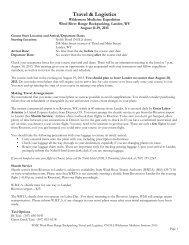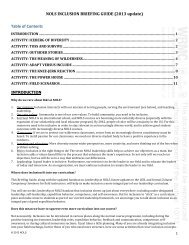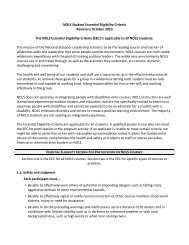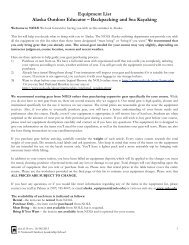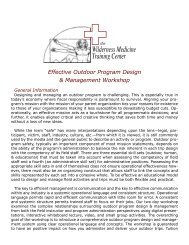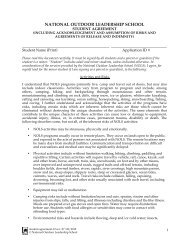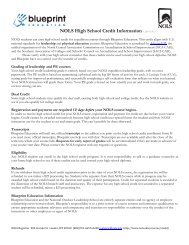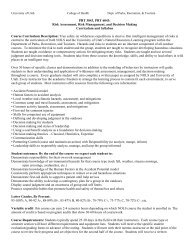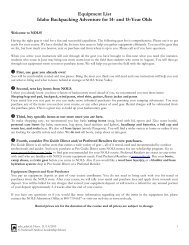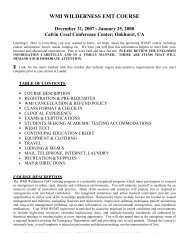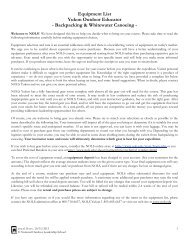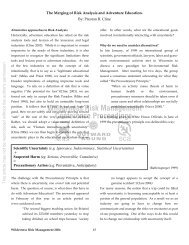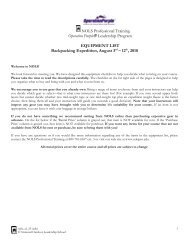introduction to the 2008 nols leadership educator notebook
introduction to the 2008 nols leadership educator notebook
introduction to the 2008 nols leadership educator notebook
You also want an ePaper? Increase the reach of your titles
YUMPU automatically turns print PDFs into web optimized ePapers that Google loves.
THE 7 NOLS LEADERSHIP SKILLSThese seven skills are a holistic skillset that need <strong>to</strong> be appliedsituationally and in combination with each o<strong>the</strong>r.Expedition Behavior• Serve <strong>the</strong> mission and goals of <strong>the</strong> group.• Be as concerned for o<strong>the</strong>rs as you are for yourself.• Treat everyone with dignity and respect.• Support <strong>leadership</strong> and growth in everyone.• Respect <strong>the</strong> cultures you come in<strong>to</strong> contact with.• Be kind and open-hearted.• Do your share and stay organized.• Help o<strong>the</strong>rs, but don’t routinely do <strong>the</strong>ir work.• Model integrity by being honest and accountable.• Say yes and deliver, or say no clearly if you cannot.• Resolve conflict in a productive manner.Competence• Display basic competence and actively improve your– knowledge.– organization and management skills.– technical skills.– physical abilities.• Set goals, make action plans, and follow through.• Take care of your personal maintenance needs <strong>to</strong> remain a highly-functioningteam member.Communication Skills• Speak up when appropriate, be silent when appropriate.• Help create a positive learning environment.• Let your group know what you expect of <strong>the</strong>m and what <strong>the</strong>y canexpect from you.• Keep people informed as <strong>the</strong> situation changes.• Listen actively—paraphrase and ask questions <strong>to</strong> clarify.• Have <strong>the</strong> courage <strong>to</strong> state what you think, feel and want.• Speak for yourself. Use “I language.”• Be empa<strong>the</strong>tic during conflicts.• In feedback,– Be timely.– Be growth-oriented.– Be specific about your observations.– Acknowledge your share of any problem.– Be clear about what you will do next.– Be as open <strong>to</strong> receiving feedback as giving it.Judgment & Decision-Making• Work <strong>to</strong> develop good judgment. Consider all available experiences,resources and information <strong>to</strong> achieve positive results.• Use situationally appropriate decision-making styles. Develop allstyles.• As a leader, choose a decision-making style and <strong>the</strong>n tell <strong>the</strong>group what it is.• Give your group choices that have acceptable consequences.• Be clear about limits and boundaries when letting people makechoices.• Use <strong>the</strong> strengths and knowledge of o<strong>the</strong>r group members <strong>to</strong>solve problems.• Help o<strong>the</strong>rs see how choices fit in<strong>to</strong> <strong>the</strong> big picture and <strong>the</strong> longview.• Question norms, challenge assumptions.Tolerance For Adversity And Uncertainty• Turn challenging situations in<strong>to</strong> opportunities.• See choices as many workable options and combinations, notei<strong>the</strong>r/or.• Learn <strong>to</strong> endure, even enjoy, hard work and challenge.• Live in rhythm with what you cannot control. Control what youcan.• Use humor. Keep things in perspective.• Function effectively under difficult circumstances. Make focuseddecisions and stay connected with o<strong>the</strong>rs.• Work effectively with different types of people.• Be patient will less competent colleagues.Self-Awareness• Understand your abilities, limitations and learning needs.• Learn from experience, <strong>the</strong>n take steps <strong>to</strong> improve.– Admit and correct your mistakes.– Be proud of your successes and build on <strong>the</strong>se.• Work at just being yourself as a leader.• Be clear with o<strong>the</strong>rs about your own values and goals.• Find a healthy balance that works for you: work hard, play, reflect,and rest.• Seek feedback from o<strong>the</strong>rs.Vision & Action• Initiate: assess what needs <strong>to</strong> be done and do it.• Motivate: add your energy and can-do attitude <strong>to</strong> projects <strong>to</strong>help motivate o<strong>the</strong>rs.• Inspire: create an environment that inspires individuals andgroups <strong>to</strong> achieve <strong>the</strong>ir highest potential.• Have empathy for o<strong>the</strong>rs, yet be decisive.• Help create what you want <strong>to</strong> see.• Use group goals and values <strong>to</strong> guide your actions.• Take risks at an appropriate level for yourself and your group.• Seek creative ways <strong>to</strong> move <strong>the</strong> group forward.• Stay open and flexible <strong>to</strong> change.• Model <strong>the</strong> way (lead by example).THE 4 NOLS LEADERSHIP ROLESDesignated Leadership: The designated leader is <strong>the</strong> head architectand guardian of <strong>the</strong> group process. She or he can delegateand should collaborate when possible, but can’t abdicate responsibilityand accountability. Complex, potentially risky, or <strong>to</strong>ughactivities and decisions are best handled with a designated leaderguiding or moni<strong>to</strong>ring <strong>the</strong> process.Active Followership: Expedition members show good <strong>leadership</strong>by following <strong>the</strong> <strong>leadership</strong> of o<strong>the</strong>rs. They seek clarity, giveinput, respect <strong>the</strong> plan, help out, and work for <strong>the</strong> betterment of<strong>the</strong> group and its goals.Peer Leadership: We practice peer <strong>leadership</strong> largely in our livingarrangement on a course. In peer <strong>leadership</strong>, each personsees what needs <strong>to</strong> be done and does it without a hierarchy. Allmembers assure quality completion of group tasks, functions andgoals. Peer <strong>leadership</strong> works better when members clarify who isresponsible for what. At NOLS, while traveling or engaging inhigher risk activities, we do not rely on peer <strong>leadership</strong> alone.Self-<strong>leadership</strong>: a group member is a leader by virtue of who<strong>the</strong>y are and how <strong>the</strong>y influence o<strong>the</strong>rs, not by <strong>the</strong> position <strong>the</strong>yhold. This is <strong>leadership</strong> through character and judgment.<strong>2008</strong> NOLS Leadership Educa<strong>to</strong>r Notebook 11Defining Leadership



